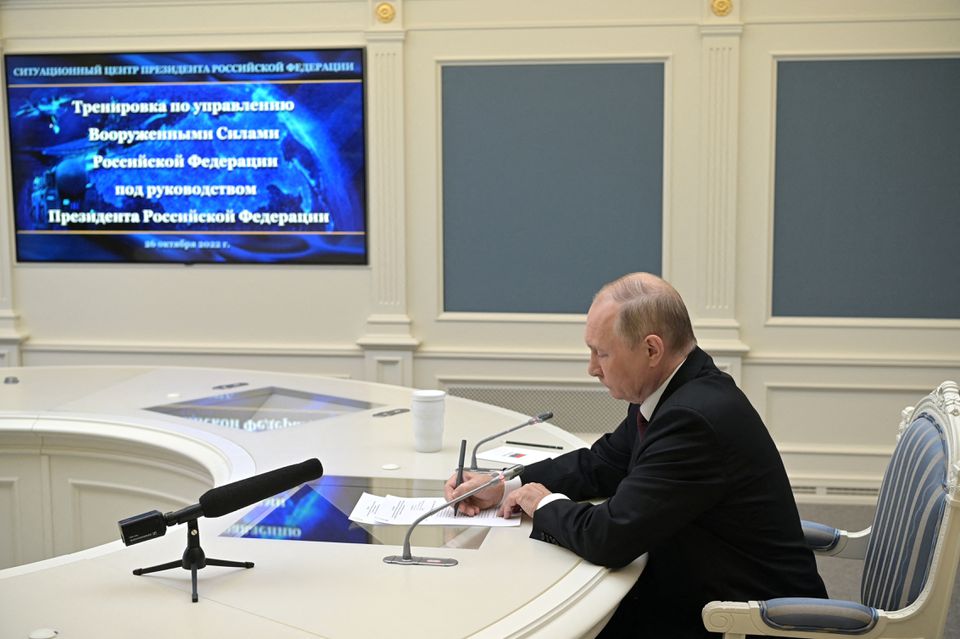NEAR KHERSON FRONTLINE, Ukraine, (Reuters) – Russia rehearsed its response to a nuclear attack today in an exercise that involved nuclear submarines, strategic bombers and ballistic missiles at a time when tensions are high over a “dirty bomb” allegation it has made against Ukraine.
Russian President Vladimir Putin remotely observed the annual exercise, called “Grom” or “Thunder”, which uses test launches to put Moscow’s nuclear forces through their paces in a show of force designed to deter and intimidate foes.
Russian officials said test launches of nuclear-capable ballistic and cruise missiles had passed off successfully.
Putin was cited by the RIA news agency as saying the potential for conflict in the world and region remained high.
The Pentagon said a day earlier that Russia had notified it of its intention to carry out the exercises at a time when NATO is rehearsing its own use of U.S. nuclear bombs based in Europe in its annual “Steadfast Noon” war games.
The nuclear muscle flexing is sensitive because Russia is on the back foot in Ukraine and has accused Ukraine of planning to detonate a “dirty bomb” laced with radioactive material.
Kyiv and the West say there is no evidence for the allegation and that the warning looks designed to escalate tension around the war in Ukraine or to serve as the justification for some kind of Russian battlefield escalation.
Western officials have expressed fear that Moscow may be tempted to use a low-yield “tactical” nuclear weapon in Ukraine to try to force Kyiv to capitulate at a time when Ukrainian forces are advancing inside the Russian-occupied Kherson province, threatening a major defeat for Moscow.
U.S. President Joe Biden warned Moscow on Tuesday that such a move would be an “incredibly serious mistake.”
Putin, who will chair a Security Council meeting later on Wednesday, has warned that Russia has the right to defend its own territory using any weapons in its arsenal, which includes the world’s largest nuclear stockpile, but has not specifically spoken of tactical nuclear weapons.
RUSSIA BRIEFS CHINA AND INDIA
Russian officials have said that Moscow’s protective nuclear umbrella has been extended to cover four Ukrainian regions Putin says he has annexed, a move not recognised by Kyiv or the West, while stressing the desire to avoid a nuclear conflict.
A day after Russia aired its “dirty bomb” allegations at the U.N. Security Council, Russian Defence Minister Sergei Shoigu briefed his Chinese counterpart Wei Fenghe by video, conveying Moscow’s concern around what it called “potential provocations” from Kyiv involving a “dirty bomb”, Shoigu’s ministry said.
A close Putin ally, Shoigu held a similar video conference with his Indian counterpart, it said.
Rajnath Singh, India’s Defence Minister, told Shoigu that nuclear weapons should not be used by any side in the Ukraine war, according to an Indian government statement.
“The prospect of the usage of nuclear or radiological weapons goes against the basic tenets of humanity,” Singh was cited as telling Shoigu.
Singh called for an early resolution to the conflict through dialogue and diplomacy, a prospect which, for now, seems remote after eight months of war amid a successful Ukrainian counter offensive that has forced Russian troops to retreat.
There was no immediate readout from Beijing on what Wei Fenghe had told Shoigu.
Washington said late on Tuesday that Moscow’s notification of its plans to carry out nuclear exercises lowered the risk of miscalculation at a time of “reckless” Russian nuclear rhetoric.
Under the New START Treaty, Russia was obliged to provide advance notification of such missile launches, U.S. officials said.
The drills present a potential challenge to the United States and its allies after Putin’s nuclear warnings, though Western officials have expressed confidence in their ability to discern the difference between a Russian drill and any move by Putin to make good on his threats.
NATO is holding its own annual nuclear drills this month, involving U.S. B-52 bombers, 14 countries and up to 60 aircraft.
Since Russian forces suffered major defeats in Ukraine in September, Putin has doubled down, calling up hundreds of thousands of reservists, announcing the annexation of occupied territory, and engaging in nuclear sabre-rattling.









